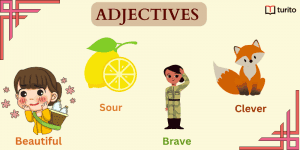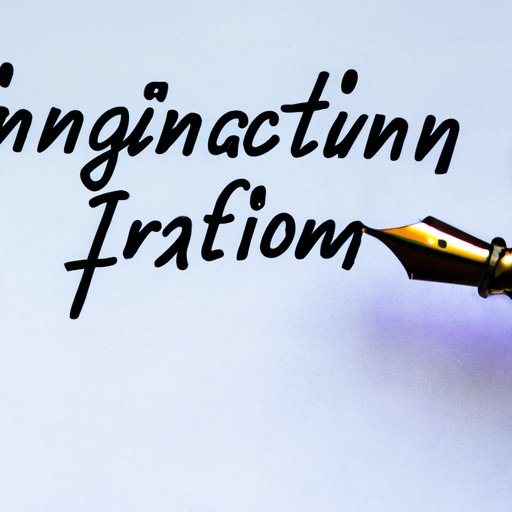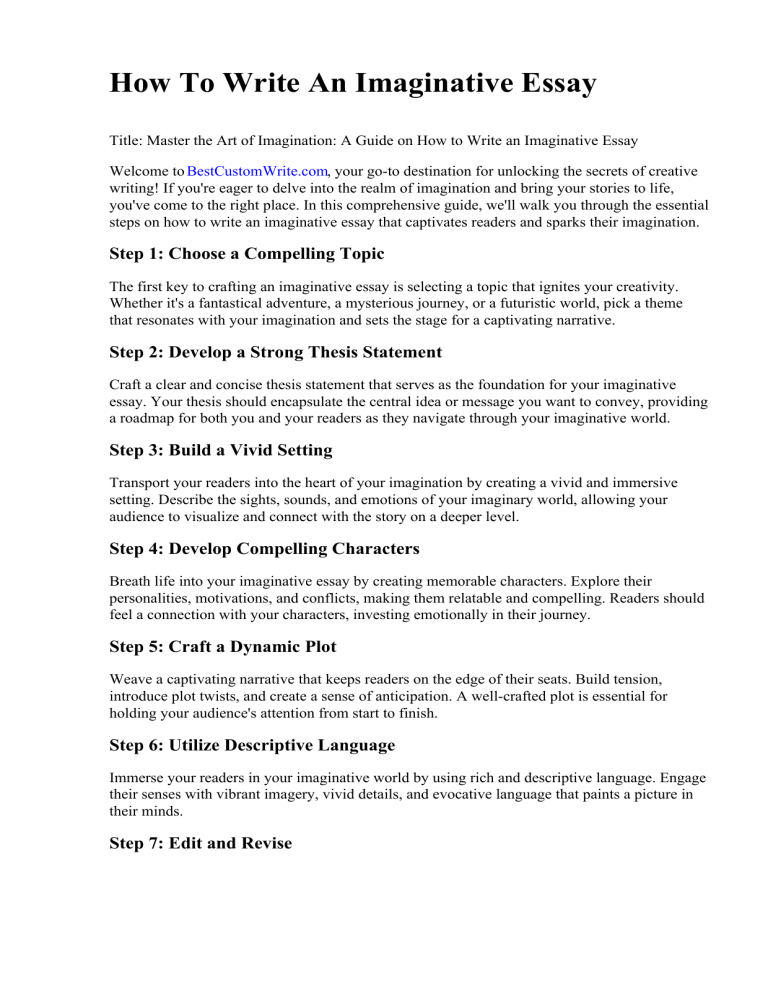
Improve your Grades

Imaginative Essay
October 21, 2024 by Sastry
Imaginative Essay: An Imaginative Essay is an essay which tends to discuss anything from space travel to fantasy land. It is basically an essay based on fiction, where you are required to put your imaginary skills/thoughts in a logical order. Your imagination will decide the depth of your essay. It is completely dependent on your creative ability and knack of bringing it in writing.
Looking for an easy way to Learning of English Grammar Exercises for Class 9 ICSE . You have to learn basic English Grammer topics like Tenses, Verbs, Nouns, etc… In this article, we will review the best English Grammer Topics and compare them against each other.
Guidelines to write Imaginative Essay
- Heightened sense of imagination.
- Add sensory details-like smell, touch, taste, etc.
- Logical flow of details.
- Crisp and clear characterization(s), if any.
- Proper punctuation’s.
- Use of formal language is not mandatory.
Sample Essays 1. If I Were A Millionaire
If wishes were horses, even beggars would ride. But sometimes dream do come true. I live in a country in which more than half of the population is below the poverty line and don’t know whether they will be able to afford the next meal.
But there is no check on one’s fancy. I wish I were a millionaire!
As a poor man, I have often experienced that rich men are generally selfish to the extent of being cruel. Their outlook on life is not human but materialistic. They forget that to be rich is not to be inhuman. When I am rich, I shall not forget God and God’s men.
I long to lead some days in comfort. Money will end the state of uncertainty in which I live today. Poverty makes you lose friends and makes one unacceptable in society.
If I were a millionaire, I would be in the company of rich friends and would be honorable. But being a millionaire is only a part of my desire.
I know I get education under very difficult circumstances. So I shall open schools and colleges for the greater good of all. My aim in life is to establish a university in the model of ancient Indian universities. I want to go back to our old culture which was once the pride of the world.
A wealthy man can do much good to this world. Money along with too many comforts and care brings evil also. I was born human and shall live a pious and noble life. This duty every man owes to God. I shall fulfill this duty and shall set a noble example before others and will be a brilliant light for misguided millionaires.
I would very much wish to encourage social service in the country. I shall make a trust which will look after the welfare of orphans. It is a pity that in our country wealthy persons do not possess charitable qualities. I shall lead a noble life and cut down my own expenses so that I may help others to live better.
I am a noble-hearted and simple person and wish to remain the same if I become a millionaire.
2. If I Were the Principal of My School
If I were the principal of my school I would bring about many changes in the system of running the school. Most of the ways, rules and regulations have become outdated and need changes. We have a load of work for the students and hardly do they find time to play.
The school starts with the morning assembly. I would change the regular pattern in which it is conducted. If I become the principal I would encourage the students to share their thoughts and experiences with their schoolmates and the teachers could guide the students with their opinions on the basis of what the students share with them. I would tell the students short stories with a moral so that they could learn some good values.
As the session begins, I would see to it that all the difficult subjects are not taught one after the other. Science should be followed by English and not by Math. Some principals have a poor knowledge of what students like and they try to thrust a lot of things down their throats without caring that they are not always receptive.
I would encourage a lot of sports and extra curricular activities like drama, music, painting, creative writing, clay modeling, photography, horse riding, swimming, dancing, etc. This would keep the students interested in coming to school and they would enjoy their long hours of stay in school. When there are so many interesting activities for the students, they remain happy and their mind is able to absorb the lessons from the most difficult subjects with greater ease.
Promoting a greater degree of personal interaction between the students and teachers, thus creating a friendly atmosphere in the classroom, is a must these days. Teachers would be friends with the students and this could help to eradicate any fear that the students may have in their mind with regard to their teachers. This again would improve the working and learning atmosphere in the school.
As a principal I would do my best to lead my school towards honors in academics, sports, social and cultural activities.
Suggested Outlines of Imaginative Essays
If you had to send a Message in a Bottle
- Imagine you were stranded on a deserted island
- You can send out one message in a bottle
- What would you write in that message?
- Why would you write those particular things?
If you could go on a Space Adventure
- If you could travel anywhere in space, where would you go and why ?
- What will you carry with you?
- What do you think it would be like there?
If you could go Back in Time
- If you could go back in time and re-experience an event in your life, what would it be?
- Would you go back to change an event that happened or to re-experience a happy time?
- Or something else
If I Were a Grown-Up
- Write about what you’d do if you were a grown-up for one day
- Why would you do it?
- Will you make any changes to your situation, if any, what would that change be?
If I Were a Teacher
- Write on what you would do if you were a teacher for a day
- What subjects would you teach?
- How would you teach them?
- If I had wings.
- I wish I were a man of immense talents.
- If I had a robot as a friend.
- If I were a master craftsman.
- I wish I had a lot of money to help the poor.
- If only I had four hands.
- How I wish for an ounce of creativity.
- Picture Dictionary
- English Speech
- English Slogans
- English Letter Writing
- English Essay Writing
- English Textbook Answers
- Types of Certificates
- ICSE Solutions
- Selina ICSE Solutions
- ML Aggarwal Solutions
- HSSLive Plus One
- HSSLive Plus Two
- Kerala SSLC
- Distance Education
Essay Curve
Essay on Imaginative – Samples, 10 Lines to 1500 Words

Essay on Imaginative: Imagination is a powerful tool that allows us to explore new worlds, create innovative solutions, and envision a better future. In this essay, we will delve into the concept of imagination and its importance in our lives. From sparking creativity to fostering empathy, imagination plays a crucial role in shaping our perceptions and understanding of the world around us. Join us as we examine the limitless possibilities of the human mind and the transformative power of imaginative thinking.
Table of Contents
Imaginative Essay Writing Tips
1. Start with a strong and engaging opening: Begin your essay with a captivating introduction that grabs the reader’s attention and sets the tone for the rest of the piece. This could be a thought-provoking question, a vivid description, or a powerful quote.
2. Develop a clear thesis statement: Clearly state the main idea or argument of your essay in a concise thesis statement. This will help guide the reader through your essay and keep your writing focused.
3. Use descriptive language: When writing imaginatively, it’s important to use descriptive language to paint a vivid picture for your readers. Use sensory details, vivid imagery, and figurative language to bring your writing to life.
4. Create well-developed characters: If you’re writing a narrative or story, make sure to create well-developed characters that are relatable and interesting. Give your characters depth by exploring their motivations, desires, and conflicts.
5. Build a compelling plot: Develop a strong plot that keeps the reader engaged and wanting to know what happens next. Include elements of tension, conflict, and resolution to create a compelling story.
6. Experiment with different perspectives: Try writing from different perspectives to explore different viewpoints and add depth to your writing. This could involve writing from the perspective of a different character, or even experimenting with different narrative styles.
7. Edit and revise: After you’ve finished writing your essay, take the time to edit and revise your work. Look for errors in grammar, punctuation, and spelling, as well as opportunities to improve clarity and coherence.
8. Seek feedback: Consider sharing your essay with others to get feedback and suggestions for improvement. This could be from friends, family, or teachers who can provide valuable insights and help you strengthen your writing.
9. Practice regularly: Like any skill, imaginative writing takes practice to improve. Set aside time to write regularly, experiment with different styles and techniques, and challenge yourself to push the boundaries of your creativity.
10. Have fun with it: Above all, remember to have fun with your imaginative writing. Let your creativity flow, explore new ideas, and enjoy the process of bringing your imagination to life on the page.
Essay on Imaginative in 10 Lines – Examples
1. Imagination is the ability to create mental images, ideas, and concepts that are not present in reality. 2. It allows us to think creatively, problem-solve, and come up with innovative solutions. 3. Imagination is a key component of artistic expression, allowing artists to envision and bring to life their creations. 4. It plays a crucial role in childhood development, helping children learn and explore the world around them. 5. Imagination can transport us to different worlds, times, and realities through storytelling and literature. 6. It enables us to empathize with others and understand different perspectives by putting ourselves in someone else’s shoes. 7. Imagination is a powerful tool for visualization and goal-setting, helping us manifest our dreams and aspirations. 8. It fosters curiosity and a sense of wonder, encouraging us to explore and discover new things. 9. Imagination is a source of inspiration and motivation, driving us to pursue our passions and interests. 10. Ultimately, imagination is a limitless and boundless force that fuels creativity, innovation, and personal growth.
Sample Essay on Imaginative in 100-180 Words
Imagination is a powerful tool that allows us to create, innovate, and dream beyond the confines of reality. It is the ability to envision possibilities that do not yet exist and to bring them to life through creativity and innovation. Imagination is what drives progress and pushes us to explore new ideas and concepts.
Through imagination, we can envision a better world, create works of art, and solve complex problems. It is the foundation of innovation and the driving force behind human achievement. Without imagination, we would be limited to the constraints of what already exists, unable to push the boundaries of what is possible.
Imagination allows us to escape the confines of our everyday lives and explore new worlds and possibilities. It is a source of inspiration and creativity that fuels our passions and drives us to pursue our dreams. In a world that is constantly changing and evolving, imagination is a valuable tool that allows us to adapt, grow, and thrive.
Short Essay on Imaginative in 200-500 Words
Imagination is a powerful tool that allows us to explore new ideas, create innovative solutions, and envision a better future. It is the ability to think outside the box, to dream big, and to see things from a different perspective. Imagination is what drives creativity and innovation, and it is what sets humans apart from other species.
One of the key aspects of imagination is the ability to visualize things that do not yet exist. This could be anything from a new invention, a work of art, or a piece of literature. Imagination allows us to see beyond the constraints of reality and to envision a world that is different from the one we currently inhabit.
Imagination also plays a crucial role in problem-solving. When faced with a difficult situation, those who are able to think creatively and imagine new possibilities are more likely to come up with effective solutions. By thinking outside the box and considering all possible options, individuals can find innovative ways to overcome challenges and achieve their goals.
Furthermore, imagination is essential for personal growth and development. By imagining new possibilities and envisioning a better future for ourselves, we can set goals and work towards achieving them. Imagination allows us to dream big and to strive for greatness, pushing us to reach our full potential and become the best version of ourselves.
In addition, imagination is a key component of empathy and understanding. By putting ourselves in someone else’s shoes and imagining what they are going through, we can develop a deeper sense of compassion and empathy for others. Imagination allows us to see things from a different perspective and to understand the experiences and emotions of those around us.
Imagination also plays a crucial role in education. By encouraging students to think creatively and to use their imagination, educators can help them develop critical thinking skills, problem-solving abilities, and a love for learning. Imagination allows students to explore new ideas, think outside the box, and engage with the material in a more meaningful way.
In conclusion, imagination is a powerful tool that plays a crucial role in creativity, innovation, problem-solving, personal growth, empathy, and education. By harnessing the power of imagination, we can envision a better future for ourselves and for the world around us. It is important to nurture and cultivate our imagination, as it is what drives us to dream big, think creatively, and strive for greatness.
Essay on Imaginative in 1000-1500 Words
Imagination is a powerful tool that allows us to explore new ideas, create innovative solutions, and envision a better future. It is the ability to form mental images, ideas, and concepts that are not present in our immediate surroundings. Imagination is what drives creativity, innovation, and progress in all aspects of life.
One of the most important aspects of imagination is its ability to inspire creativity. When we imagine new possibilities, we are able to think outside the box and come up with unique solutions to problems. For example, when faced with a difficult challenge at work, a person with a strong imagination may be able to envision a creative solution that others may not have thought of. This ability to think creatively can lead to breakthroughs in science, technology, art, and many other fields.
Imagination also plays a crucial role in innovation. Without the ability to imagine new ideas and possibilities, we would never be able to invent new technologies, create new products, or develop new ways of doing things. For example, the invention of the light bulb by Thomas Edison was the result of his imaginative thinking and relentless experimentation. Without his ability to imagine a world where light could be produced artificially, we would still be relying on candles and oil lamps for illumination.
Furthermore, imagination is essential for envisioning a better future. By imagining a world where poverty is eradicated, where peace prevails, and where all people have access to education and healthcare, we are able to work towards creating that reality. Imagination allows us to dream big and set ambitious goals for ourselves and our society. It motivates us to take action and make positive changes in the world.
In addition to its practical applications, imagination also plays a crucial role in our personal lives. It allows us to escape from the stresses and pressures of everyday life and enter into a world of our own creation. Through imagination, we can explore new worlds, meet interesting characters, and experience adventures that we would never be able to in reality. This ability to escape into our own imaginations can be a source of comfort, inspiration, and joy.
Imagination is also important for our emotional well-being. It allows us to process our thoughts and feelings in a creative and constructive way. For example, writing poetry, painting, or playing music can be therapeutic ways to express our emotions and make sense of our experiences. Imagination gives us a way to channel our emotions and create something beautiful out of them.
In conclusion, imagination is a powerful and essential aspect of human life. It drives creativity, innovation, and progress in all areas of society. It allows us to envision a better future, escape into our own worlds, and process our emotions in a constructive way. Without imagination, we would be limited in our ability to think, create, and dream. It is a gift that we should cherish and cultivate in ourselves and others.
Related Essays
Essay on A Visit To A Fair – 10 Lines, 100 to 1500 Words
Value of Games And Sports – Essay in 10 Lines, 100 to 1500 Words
Essay on Importance of Teacher – 100, 200, 500, 1000 Words
Essay on A Visit To A Museum – 100, 200, 500, 1000 Words
Essay on Effect of Social Media On Youth
Essay on Shri Guru Nanak Dev Ji – Short & Long Essay Examples
Essay on Nuclear Family – Short Essay & Long Essay upto 1500 Words
Essay on Anudeep Durishetty – 10 Lines, 100 to 1500 Words
Essay on Non Violence – Samples, 10 Lines to 1500 Words
Covid 19 Responsive School – Essay in 10 Lines, 100 to 1500 Words
Leave a Comment Cancel reply
Save my name, email, and website in this browser for the next time I comment.
How to Write an Imaginative Essay

Imaginative essays are easily written when you have the appropriate skills and experience. However, even if you lack such a gift as literary and/or artistic abilities, you can still write a good essay . Here we will give you some useful tips about writing an imaginative essay.
How to write an imaginative essay – 7 key tips
Tip 1: choose the most extravagant imaginative essay topic.
If you have various options to choose, opt for writing on the “most extravagant” topic. The advantages are the following: first, your imaginative essay will be unique in a sense that there will not be another one to compare it with; and second, teachers welcome working on non-standard topics and also non-traditional approaches to the assignments they give.
TIP 2: Start writing an imaginative essay essay when inspired
Don’t wait for too long; start writing when you have some inspiration. This will only be your first draft. Follow your internal feeling of aesthetics. Analysis and reflection are not proper methods for carrying out the task; you’d rather search for associations provoked by the topic/title. Let’s say, your topic is “A day of the raindrop.” What is your first association? Would you speak from first person, or will merely tell a narrative about the raindrop? What situation should be included in your essay? Where does it take place?
Advice : try to pick up an idea that suits you the most, and then develop it. If you start analyzing, then you will probably run out of time.
TIP 3: Be original
Be original - the situation you are describing could be fantastic, or at least not realistic. A raindrop could live as a human being (like the animals in the fairytales); but it can also have different experiences than ours (to meet aliens, for instance). Still, you should keep the balance between realism and fantasy: the most imaginative essay you could write is a surrealistic one, but it will probably make your instructor unsatisfied with your job.
TIP 4: Avoid indirect speech in your imaginative essay
Avoid using indirect speech in your imaginative essay. We advise you to describe the interaction between the characters of your imaginative essay through a narrative. This will help you save place; otherwise, you will write a long story that no one will read.
In your imaginative essay, describe the interaction between the characters through a narrative. This will help you save place; otherwise, you will write a long story that no one will read. Tweet This
TIP 5: Incorporate a message
Incorporate a message in the imaginative essay. Literature is produced by human beings for human beings; thus, it should include some message, idea, thesis , and so forth. In your case, it is not necessary to have a clear message, but still it is good to write the essay while having a certain idea in mind.
TIP 6: Use figures of speech
Use metaphors, allegories, similes, and other figures of speech. Do not be too “simplistic” in the language employed in your imaginative essay. It is a common flaw of the most contemporary young authors to believe that the style of expression does not have influence on the reader’s mind. On the contrary, the exquisite style always attracts more readers.
TIP 7: Read aloud and revise
Read aloud your imaginative essay to yourself. This will help you realize some incoherencies or vagueness in it. Revise the paper in order to have a better style and grammar. It is not recommended, however, to change the contents of the essay, as it may affect its quality.
In order to write this type of essay, you need imagination and creativity. Every human being is endowed with these abilities, so don’t hesitate and start writing now!
Order Paper
Our guarantees, customer feedback.

© 2024 SolidEssay. All Rights Reserved.
Powered by Data Researchers Network
Get in touch with us
Are you sure you want to logout?
Please select your grade.
- Earth and space

Steps for Imaginative Writing in Paragraph Essay Form
Imaginative writing:.
Imaginative writing, also known as creative writing: This form of writing expresses the writer’s thoughts and feelings in an imaginative, often unique, and poetic way. Imaginative writing can exist in many different forms, but what unites them all is that the writer is free to use their own ideas and imagination. Imaginative writing is also known as Creative writing .
Here are Some Instances of Imaginative Writing:
The topic like the feelings and experiences of the sailor wrecked on the vast sea is imaginative writing . In these types of writing, the writer places himself in imagination in a position in which he doesn’t have any actual experience of that type.
Topics like “If I Were the prime minister” or “The Autobiography of a Horse” also fall under the category of imaginative writings/essays.
Writings are usually divided into two basic types:
- Imaginative/ Creative
Creative writing revolves around imagination, artistic skills, and the ability to figure out situations that are far from reality.

On the other hand, logical writings are very well structured and mostly deal with important topics by employing precise methodology.
The main goal of imaginative essays/writings is to make the reader enjoy them in an aesthetic sense. The aim of logical writing/essays is to discuss an issue or solve a definite problem.
Extent Of An Imaginary Writing:
Imaginative writing tends to take topics from space travel to fantasy landscapes. This type of Writing is mainly based on fiction, where imaginary skills/thoughts in a logical order are expressed.
Normally, the extent of imagination will decide the depth of the essay.
Steps To Write A Good Imaginative Story/Essay:
Step 1: choose the most extravagant imaginative essay topic.
If there are various options to choose from, opt for writing on the “most extravagant” topic.
The advantages of choosing such a topic are:
- Firstly, this type of topic of imaginative writing is unique – there is no such piece of writing.
- Secondly, working on non-standard topics and also non-traditional approaches are always preferred.
STEP 2: Start Writing an Imaginative Piece Only When You Are Highly Inspired.
Without waiting for too long, start writing when you are highly inspired. This will enable you to be more creative in your approach. However, this will only be the first draft.
STEP 3: Be Original
Originality is the essence of imaginative writing. The circumstances or the situation can be fantastic and not a real one.
STEP 4: Avoid Indirect Speech in Your Imaginative Writing
It’s a good idea to describe the interaction between the characters of your imaginative writing through a narrative. This will help you maintain the word limit. Otherwise, it will lead to writing a long story that no one will read.
STEP 5. Incorporate a Message
Incorporate a message in imaginative writing. It is not necessary to have a clear message in imaginative writing but some sort of indication of the theme would be preferable.
Step 6. Use of Figures of Speech in Imaginative Writing
The use of metaphors , allegories, similes , and other figures of speech will make the writing more creative. Using simplistic language is not advisable in your imaginative writing. On the other hand, the exquisite style always attracts more readers.
STEP 7. Read Aloud and Revise
Read aloud your imaginative writing to identify the vagueness in your writing. Revise your writing in order to have a better style and grammar. It is not recommended. However, at this stage, changing the contents of the writing may affect its quality. In order to write this type, you need lots of imagination and creativity.
Salient Features of Imaginative Writing:
- Heightened sense of imagination.
- Add sensory details like smell, touch, taste, etc.
- The logical flow of details.
- Crisp and clear characterization(s), if any.
- Proper punctuation.
- The use of formal language is not mandatory.
The Elements of Imaginative Writing and Its Importance
- Unique storyline or plot:
What differentiates imaginative writing and other forms of writing is the uniqueness of ideas or thoughts. Most imaginative writers create their own plots formed on their own unique ideas. Without having a plot, there’s no story. And without a story, it’s like just writing facts on paper and not imaginative writing.
- Character development
Characters are necessary for Imaginative pieces of writing. Character development brings change throughout the duration of the writing or story.
- Underlying Theme
Imaginative writing needs some theme or message to make it complete. It is the form by Writing an imaginative story lesson can be taught.
- Visual Descriptions
When reading a newspaper, paragraphs of descriptions are read that depict all the surrounding places where the incident took place more precisely using visuals. Visual descriptions largely serve creative writing.
Visuals are needed in order to help the reader understand what the situation in the writing looks like.
Through visuals or images, the reader is more involved and makes them imagine themselves in the characters’ shoes – which makes the reader more curious to read.
- Point of View
We generally use the first person and third person in imaginative writing.
First Person: The narrator is mainly the main or important character-which means that when we read the passages it includes “I”
Third Person– In imaginative writing the third person is multiple, and the third person is omniscient. However, the first person is what is typically found.
- Imaginative Language
Part of what makes imaginative writing creative is the way you choose to craft the vision in your mind. It can be achieved by the use of more anecdotes, metaphors, similes, and figures of speech. Use of the other figurative language brings a vivid image to the reader’s mind.
- Emotional Appeal
All writings possess emotional appeal. Nevertheless, it’s the main goal of creative writing. It makes the reader more involved and enthusiastic in the situation of the story or paragraphs.
Part of what makes imaginative writing creative is the way you choose to craft the vision in your mind. The use of anecdotes, metaphors, similes, figures of speech, and other figurative language in order to bring an effect of a vivid image in the reader’s mind.
- Proofreading and revision
This is the most important aspect of creative writing. Proofreading and revision are different aspects. Revision of pieces of writing is done to improve the content of writing whereas proofreading is done to identify and correct errors of punctuation/grammar etc.

Related topics


Exploring the World of Adjectives: Types, Usage, and Examples
What are Parts of Speech? Parts of speech determine words’ grammatical and semantic position in a sentence. Activity time The parts of speech are nouns, adverbs, conjunctions, pronouns, interjections, adjectives, articles, prepositions, and verbs. Identify the parts of speech of the underlined words in the following sentences. White- Adjective Big- Adjective Exciting- Adjectives New- […]

Memoir Writing: Basic Elements, Structures, and Types
Memoir: A memoir is a narrative written from an author’s perspective about a particular facet of his/her own life. ‘Memoir’ word comes from the French word ‘memoire’, which means ‘memory’ or ‘reminiscence’. Example Night: Elie Wiesel gives an account of how he survived his teenage years at Auschwitz and Buchenwald concentration camps during World War […]

Identification of Main Idea in Fiction and Non-fiction
Every story or paragraph or non-fictional text has at least one main idea. The MAIN IDEA is what the text is mostly about. (It is backed up or supported by SUPPORTING DETAILS) Before discussing how to find the main idea, we shall first look at TOPIC. Can you define a topic? A topic can be […]

Writing an Article: Structure and Essential Tips
What is an article? Structure of Article Writing : Title : Draw the attention of readers with an attractive title and indicate the main topic of the article Introduction : Attract the reader’s attention with a sentence that gives a general presentation of the topic. Main Body : Between these sentences, the body should do […]

Other topics

How to Find the Area of Rectangle?

How to Solve Right Triangles?

Ways to Simplify Algebraic Expressions

The Enlightened Mindset
Exploring the World of Knowledge and Understanding
Welcome to the world's first fully AI generated website!
Imaginative Writing: Exploring Different Types and Benefits
By Happy Sharer

Introduction
Imaginative writing is an art form that allows you to explore and express your thoughts, ideas, and feelings through the written word. It’s a form of creative expression that allows you to bring your stories to life with vivid imagery and powerful language. Imaginative writing is often used to explore themes and emotions, such as love, loss, joy, and sorrow.
At its core, imaginative writing is about using the power of words to tell stories. It’s a way to explore different perspectives, create vivid settings, and develop compelling characters. In this way, it can be seen as a form of escapism, allowing you to explore different worlds and experiences without ever leaving your own.
Exploring Different Types of Imaginative Writing
Imaginative writing comes in many forms, including fiction, poetry, and non-fiction. Each type of imaginative writing has its own unique characteristics and style.
Fiction is one of the most popular forms of imaginative writing. It is a story or narrative that is not necessarily based on real events. Fiction can take many forms, from novels and short stories to plays and screenplays. Regardless of the format, fiction allows you to explore a wide range of topics and emotions. It gives you the freedom to create any kind of world you want, populated with characters of your own design.
Poetry is another form of imaginative writing. It is a form of literature that uses rhythm and rhyme to convey emotion and evoke feeling. Poetry is often seen as a form of creative expression, allowing writers to explore their innermost thoughts and feelings. It can also be used to explore larger topics, such as politics, religion, love, and loss.
Non-Fiction
Non-fiction is a type of imaginative writing that is based on real events and facts. Non-fiction can take many forms, such as biographies, autobiographies, memoirs, essays, and even journalism. This type of writing allows you to explore real-world issues and present them in an interesting and engaging way.

Tips for Crafting a Creative Piece of Imaginative Writing
Crafting a creative piece of imaginative writing can be both daunting and rewarding. Here are some tips to help you get started:
Brainstorm Ideas
Before you start writing, spend some time brainstorming ideas. Think about topics that interest you and what kind of story you want to tell. Brainstorming is a great way to get your creative juices flowing and to come up with new and interesting ideas.
Use Interesting Characters and Settings
When creating a story, be sure to create interesting characters and settings. Characters should be well-rounded and have distinct personalities. Settings should be vivid and detailed, so readers can easily picture the world you’re creating.
Incorporate Imagery
Imagery is an important part of imaginative writing. Use descriptive language to evoke emotion and draw readers into the story. This can be done through the use of metaphor, simile, personification, and other literary devices.
Utilize Figurative Language
Figurative language is a great way to add depth and complexity to your writing. Using figurative language allows you to explore different ideas and concepts in an interesting and engaging way. Examples of figurative language include alliteration, hyperbole, and idioms.

Showcasing Examples of Famous Imaginative Writing Pieces
Throughout history, there have been many examples of imaginative writing that have captivated readers and moved them emotionally. Here are a few examples of classic pieces of imaginative writing:
“The Raven” by Edgar Allan Poe
“The Raven” is a famous poem by Edgar Allan Poe. Written in 1845, the poem tells the story of a man who is visited by a raven, which speaks to him in a mysterious language. The poem is renowned for its dark and haunting imagery, which has captivated readers for centuries.
“The Great Gatsby” by F. Scott Fitzgerald
“The Great Gatsby” is a novel by F. Scott Fitzgerald. Published in 1925, the novel tells the story of Jay Gatsby, a wealthy man living in New York City during the Roaring Twenties. The novel is renowned for its vivid depiction of the Jazz Age and its exploration of themes such as love, wealth, and ambition.
“To Kill a Mockingbird” by Harper Lee
“To Kill a Mockingbird” is a novel by Harper Lee. Published in 1960, the novel follows Scout Finch, a young girl growing up in the small town of Maycomb, Alabama. The novel explores themes such as racism, injustice, and courage, and is widely considered to be one of the greatest works of American literature.

An Analysis of How Imaginative Writing Enhances Imagination and Creativity
Imaginative writing is an excellent way to stimulate the mind and encourage creative thinking. Through imaginative writing, you are able to explore different perspectives, create vivid settings, and develop compelling characters. This type of writing can also help expand your knowledge and understanding of the world around you. Here are a few ways in which imaginative writing can enhance imagination and creativity:
Stimulates the Mind
Imaginative writing stimulates the mind and encourages creative thinking. By exploring different worlds and experiences, you are able to gain a better understanding of yourself and the world around you. This can help spark new ideas and open up new possibilities.
Expands Knowledge
Imaginative writing can also help expand your knowledge and understanding of the world. By reading and writing imaginative stories, you are able to explore different cultures and societies, as well as gain insight into different points of view.
Encourages Creative Thinking
Imaginative writing also encourages creative thinking. Through writing, you can explore different ideas and concepts in an engaging and interesting way. This can help you come up with new and innovative solutions to problems, as well as generate new ideas.
Imaginative writing is a powerful form of creative expression that allows you to explore and express your thoughts, ideas, and feelings. It comes in many forms, including fiction, poetry, and non-fiction. In addition to being a great form of escapism, imaginative writing can also stimulate the mind, expand knowledge, and encourage creative thinking. Whether you’re writing a novel, a poem, or a screenplay, imaginative writing can be a great way to explore different worlds and experiences.
(Note: Is this article not meeting your expectations? Do you have knowledge or insights to share? Unlock new opportunities and expand your reach by joining our authors team. Click Registration to join us and share your expertise with our readers.)
Hi, I'm Happy Sharer and I love sharing interesting and useful knowledge with others. I have a passion for learning and enjoy explaining complex concepts in a simple way.
Related Post
Unlocking creativity: a guide to making creative content for instagram, embracing the future: the revolutionary impact of digital health innovation, the comprehensive guide to leadership consulting: enhancing organizational performance and growth, leave a reply cancel reply.
Your email address will not be published. Required fields are marked *
Comprehensive Guide to the Latest News on the US Election 2024
Expert guide: removing gel nail polish at home safely, trading crypto in bull and bear markets: a comprehensive examination of the differences, making croatia travel arrangements.
- No category
How To Write An Imaginative Essay

Related documents

Add this document to collection(s)
You can add this document to your study collection(s)
Add this document to saved
You can add this document to your saved list
Suggest us how to improve StudyLib
(For complaints, use another form )
Input it if you want to receive answer

IMAGES
VIDEO
COMMENTS
Let's take a deep dive into the creation process of narrative and imaginative essays. 1. Generating and Developing Ideas: A crucial aspect of creating an imaginative essay is the ability to come up with and develop original ideas. You need to consider the sequence of events in your narrative and how you can position the reader to create the ...
Imaginative Essay: An Imaginative Essay is an essay which tends to discuss anything from space travel to fantasy land. It is basically an essay based on fiction, where you are required to put your imaginary skills/thoughts in a logical order. Your imagination will decide the depth of your essay. It is completely dependent on your […]
An imaginative essay is fiction, actually a type of short story. Students are asked to imagine a particular historical or fantastic situation and write the rest of the story. Depending on the prompt, the imaginative essay can discuss anything from space travel to civil rights. Because of this wide variation, some ...
Short Essay on Imaginative in 200-500 Words. Imagination is a powerful tool that allows us to explore new ideas, create innovative solutions, and envision a better future. It is the ability to think outside the box, to dream big, and to see things from a different perspective. Imagination is what drives creativity and innovation, and it is what ...
Imaginative essays are easily written when you have the appropriate skills and experience. However, even if you lack such a gift as literary and/or artistic abilities, you can still write a good essay. Here we will give you some useful tips about writing an imaginative essay. How to write an imaginative essay - 7 key tips TIP 1: Choose the ...
Imaginative essays build students' skills of storytelling and presentation while they learn to experiment with styles and become more efficient with words. Imaginative Essay Topics One imaginative essay topics idea is the "leading line" which presents an image that can excite the imagination of the writer into thinking of a complete experience ...
The main goal of imaginative essays/writings is to make the reader enjoy them in an aesthetic sense. The aim of logical writing/essays is to discuss an issue or solve a definite problem. Extent Of An Imaginary Writing: Imaginative writing tends to take topics from space travel to fantasy landscapes. This type of Writing is mainly based on ...
This article explores imaginative writing and its various benefits, including different types of imaginative writing, tips for crafting a creative piece, and analysis on how it enhances imagination and creativity. ... Non-fiction can take many forms, such as biographies, autobiographies, memoirs, essays, and even journalism. This type of ...
Step 1: Choose a Compelling Topic The first key to crafting an imaginative essay is selecting a topic that ignites your creativity. Whether it's a fantastical adventure, a mysterious journey, or a futuristic world, pick a theme that resonates with your imagination and sets the stage for a captivating narrative. Step 2: Develop a Strong Thesis ...
An imaginative essay is a type of essay that discusses anything from space travel to fantasy land. It is essentially a fictional essay in which you must arrange your imaginary skills/thoughts in a logical order. The depth of your essay will be determined by your imagination. It is entirely dependent on your creative ability and ability to ...